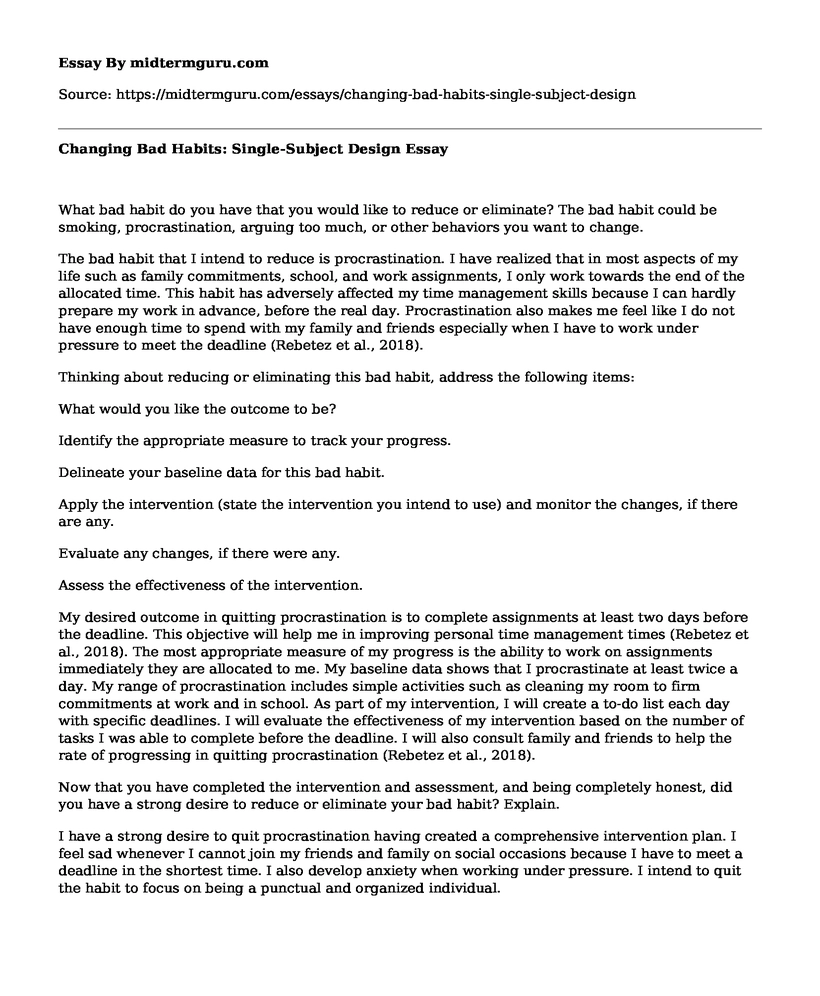What bad habit do you have that you would like to reduce or eliminate? The bad habit could be smoking, procrastination, arguing too much, or other behaviors you want to change.
The bad habit that I intend to reduce is procrastination. I have realized that in most aspects of my life such as family commitments, school, and work assignments, I only work towards the end of the allocated time. This habit has adversely affected my time management skills because I can hardly prepare my work in advance, before the real day. Procrastination also makes me feel like I do not have enough time to spend with my family and friends especially when I have to work under pressure to meet the deadline (Rebetez et al., 2018).
Thinking about reducing or eliminating this bad habit, address the following items:
What would you like the outcome to be?
Identify the appropriate measure to track your progress.
Delineate your baseline data for this bad habit.
Apply the intervention (state the intervention you intend to use) and monitor the changes, if there are any.
Evaluate any changes, if there were any.
Assess the effectiveness of the intervention.
My desired outcome in quitting procrastination is to complete assignments at least two days before the deadline. This objective will help me in improving personal time management times (Rebetez et al., 2018). The most appropriate measure of my progress is the ability to work on assignments immediately they are allocated to me. My baseline data shows that I procrastinate at least twice a day. My range of procrastination includes simple activities such as cleaning my room to firm commitments at work and in school. As part of my intervention, I will create a to-do list each day with specific deadlines. I will evaluate the effectiveness of my intervention based on the number of tasks I was able to complete before the deadline. I will also consult family and friends to help the rate of progressing in quitting procrastination (Rebetez et al., 2018).
Now that you have completed the intervention and assessment, and being completely honest, did you have a strong desire to reduce or eliminate your bad habit? Explain.
I have a strong desire to quit procrastination having created a comprehensive intervention plan. I feel sad whenever I cannot join my friends and family on social occasions because I have to meet a deadline in the shortest time. I also develop anxiety when working under pressure. I intend to quit the habit to focus on being a punctual and organized individual.
References
Prakash, P., & Singh, A. R. (2018). The role of group therapy to improve quality of life in individuals with alcohol dependence. Indian Journal of Health & Wellbeing, 9(2), 205-210.
Schaller, G., Blanck, P., Vogel, E., Vonderlin, E., Bents, H., & Mander, J. (2018). Therapeutic processes in group therapy: Intersections between general change mechanisms and motivational stages of change from patient perspective. European Journal of Psychotherapy & Counselling, 20(3), 312-336.
Rebetez, M. M. L., Rochat, L., Barsics, C., & Van der Linden, M. (2018). Procrastination as a Self-Regulation Failure: The Role of Impulsivity and Intrusive Thoughts. Psychological Reports, 121(1), 26-41.
Cite this page
Changing Bad Habits: Single-Subject Design. (2022, Aug 18). Retrieved from https://midtermguru.com/essays/changing-bad-habits-single-subject-design
If you are the original author of this essay and no longer wish to have it published on the midtermguru.com website, please click below to request its removal:
- Servant Leadership in Nursing Team
- Essay on Managing Staff in High-Risk Countries
- Paper Example on Health Planning and Policy Management
- Cultural Qualities and CSR: Exploring Sao Paulo, Brazil and Shenzhen, China - Essay Sample
- Physiological Needs for Employee Well-Being and Performance - Essay Sample
- Leadership Strategies for Change: Achieving Success in an Organizational Transition - Essay Sample
- Essential Resource: Optimizing Employee Collaboration for Production - Essay Sample







